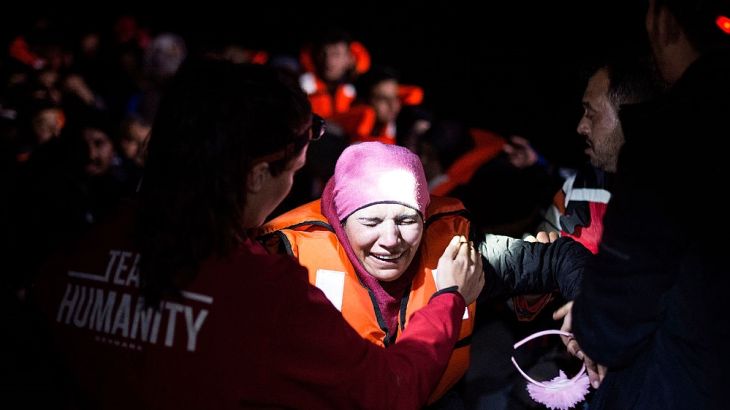
The refugee crisis and the Greeks: One year on
A year after the refugee crisis peaked in Europe, we speak to Greeks about the emotional and political aftermath.
Scenes of refugees on the move through Europe at the height of the refugee crisis in 2015 are etched into our collective consciousness. Last year, over one million people made the journey to Europe.
Far less people have made the crossing this year. According to the International Office for Migration, at least 335,000 refugees and migrants made it across the sea in 2016.
”I
. Sadness was when I had to deal with old people because with the young you have in mind that perhaps they will find their life again or they will be back in their country one day, or they will find a kind of life in another country in Europe. But for the oldest people, really I felt so sad to see them watching the sea because they knew that they will never be back.”]
This drop in numbers is due largely to the deal between the European Union and Turkey, which agreed to hold back people trying to go to Greece in exchange for money and logistical support from the Europeans.
But m any still make the journey, and the people who live in Greece – particularly on the islands – are now caught up in the emotional and political aftermath of last year’s events.
On Talk to Al Jazeera, we look at the situation for refugees and Greeks one year after the refugee crisis peaked in Europe.
The island of Lesbos is where the bulk of refugees arrive. At times, the situation there has been chaotic. Sometimes riot police are called in.
But away from the public eye, people who live on the island of Lesbos have made real efforts to welcome and help the people who arrive.
One of them is Dafne Ploumidi, who runs Votsala Hotel in Lesbos.
Ploumidi spoke to us about why she feels compelled to help refugees. She also tells us how she believes the media has exaggerated the influx of refugees and has, in turn, dissuaded tourists from visiting the holiday island.
Her experiences interacting with and helping refugees has prompted Ploumidi to publish a children’s book for her grandchild which deals with some the themes she’s encountered in the past year – integration, altruism, and solidarity.
We also speak to Fontini Vasiliou, a nurse who joined the Hellenic Rescue Team, a Greek humanitarian organisation which have boats and equipment to save people at sea.
Earlier this year, the United Nations refugee agency UNHCR awarded a humanitarian prize to the Hellenic Rescue Team.
“I felt that I wanted to offer something to those people, those people who just walk [along] the roads, needing help, wet, with kids,” she says.
“I just couldn’t stand to not do anything,” Vasiliou, a mother of three and a grandmother, tells us. More than shock, she says, seeing the refugees come to Lesbos has saddened her.
“They have suffered from hypothermia, but most of all, they have suffered from insecure feelings, all these people. They need a warm welcome because they have fought with the sea, the wind; they are cold and they just need someone to tell them, ‘You’re OK. We can carry you’,” Vasiliou says.
Others have pitched in to help the new arrivals with shelter or food in their own way.
Maria Makeogianni has a small restaurant by the sea on the island of Samos. Every day for six months, she has fed refugees for free at her restaurant. Her friend who works with the Greek police would give Makeogianni’s name and that of her restaurant to refugees who would come to eat for free.
“The fridge is always empty because I never say no,” she says.
But helping refugees brought an unexpected consequence – she no longer has customers and her neighbours now shun her.
“The situation with the refugees has damaged my business,” Makeogianni says. She says customers think she’s “doing something bad just because I feel for them”.
“I have offered so much, and nobody says good morning to me now.”
She says at first the locals all helped, but now they don’t want strangers on the island. They blame the refugees for the island’s struggling economy, which, Makeogianni says, was bad before the refugees arrived.
“We have to embrace the refugees,” she says, “in order for the island and everyone to benefit.”
There are differences of opinion across Greece on how to deal with the refugee crisis. We also spoke to people in Athens, some of whom say they now feel as though they live in a foreign country or that refugees have no respect for Greece.
Back on Samos, Makeogianni says she will help no matter what happens.
“I have never been afraid of the immigrants or the foreign people. I am afraid of the Greeks,” Makeogianni says.
You can talk to Al Jazeera too. Join our Twitter conversation as we talk to world leaders and alternative voices shaping our times. You can also share your views and keep up to date with our latest interviews on Facebook .